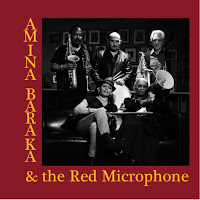By Paul Acquaro
Poet and activist Amina Baraka, has just released, I believe, her first recording on the storied ESP-Disk label. Her album of spoken word and inside/outside jazz is a spot-on debut, drawing deeply on her life, culture, and politics. Baraka is the widow of writer, activist, and music critic, Amiri Baraka, mother of current Newark, NJ mayor Ras Baraka, and has a lot to talk about.
It starts with a simple melody on piano, then sax, propelled by a straight-ahead drum beat, Baraka lets out a blood curdling scream matched tonally by the flute and sax, who help her land on the phrase ‘Mama cries time step’. He words are sharp and clear, and her tone somewhere between scolding and excited. I still haven’t figured out what all the words mean on this one, but I don’t mind, the words fly by, syllables to be savored, and meanings to mull. The gun-slinger metaphor for Billy Bang’s playing in ‘The Spirit of Billy Bang’, however, I get. Along with the spare accompaniment from bassist Laurie Towers, it’s a parable about the late violinist – or maybe it is about the woman playing the bass – or maybe again its about the free associations and sumptuous imagery that end up meaning more that way, anyway.
The rest of the band re-joins on ‘Things I Like’, woodwindists Ras Moshe Burnett and Rocco John Iacovone (also on piano), drummer John Pietaro and Towers start in on a relaxed lounge number as Baraka cites things that she likes: a Monk tune, Albert Ayler’s Ghost, Henry Fonda, a People’s War, a Revolution, and sushi, among life’s other pleasures. Later, over a caressing blues, Baraka reminisces about growing up on ‘Afro American Child’. It’s a tribute to the past and the hard truths of growing up, going from memories of “men in striped suits and big country hats” to “women standing over the stove frying chicken, one hand on the small of they back” but as time moves on, the music grows wilder, and memories turn to “growing up, taking rides in rich people’s neighborhoods” and then to “we grew up without civil rights … marching with Dr. King … knowing we couldn’t turn the other cheek”. This is a twenty minute free associative tour de force of American history, through the words of someone who lived it. It’s a reminder of where we have come from, and how much further there is to go. The music and words mix and feed off each other, reflecting each other’s intensity and meaning, a quote from a Monk tune or the C-Jam blues may suddenly appear, and so may a passage as free as it comes.
While I’ve only made it about halfway through the album here, perhaps a little more, there’s more to take in, especially later as the past turns to the present on ‘Fascists’. With her sometimes acidic, sometimes sweet, but always on point lyrics, Baraka and her band of like minded travelers have delivered an unexpected gem.



